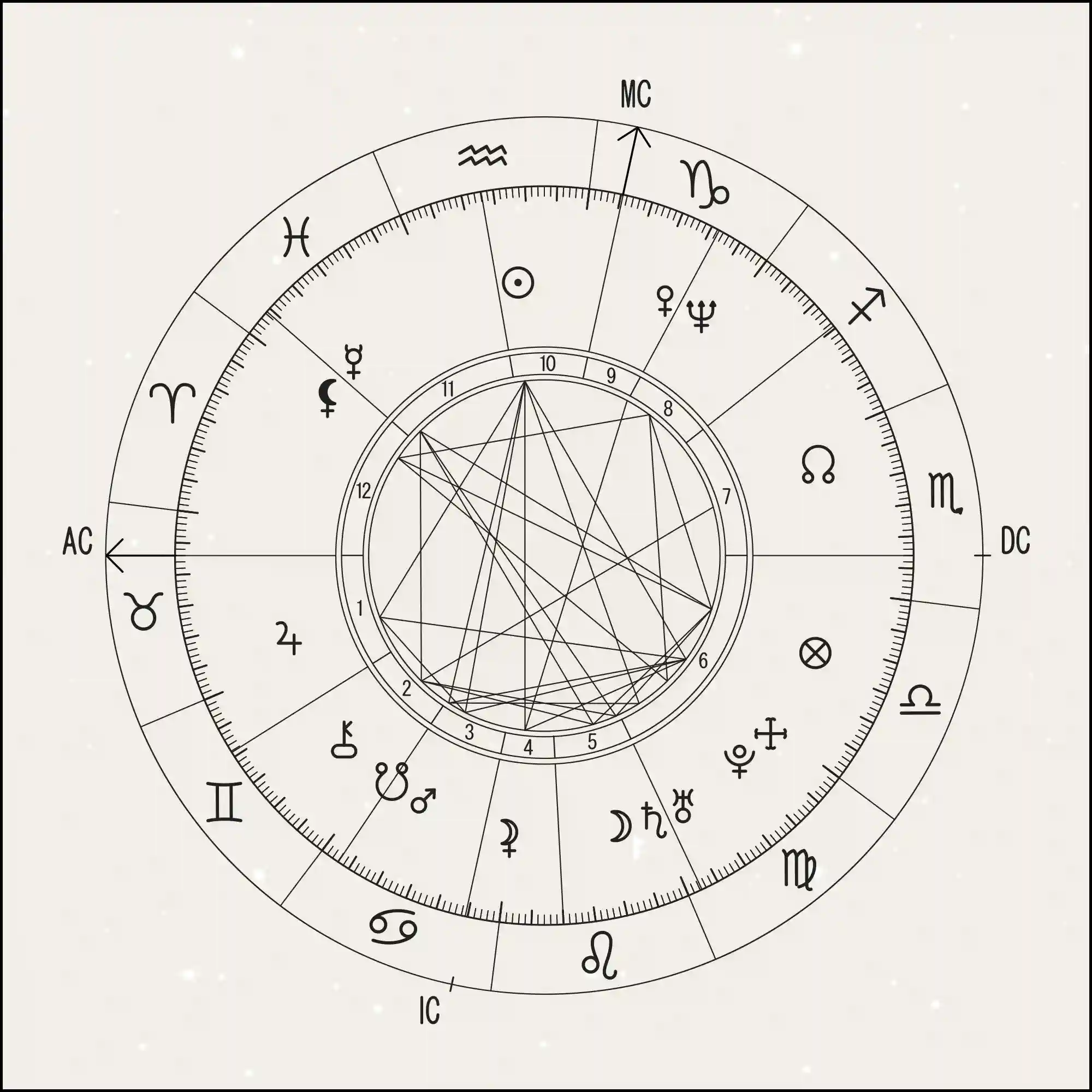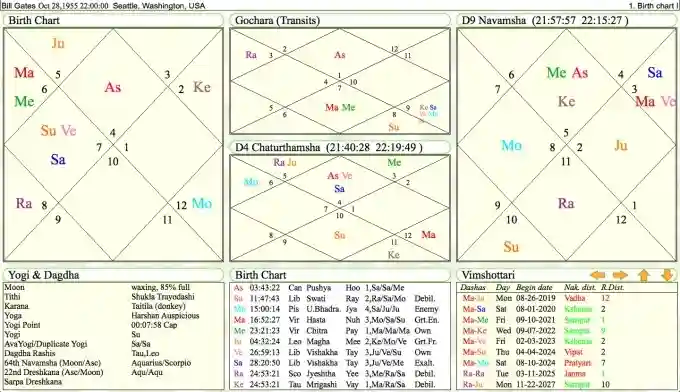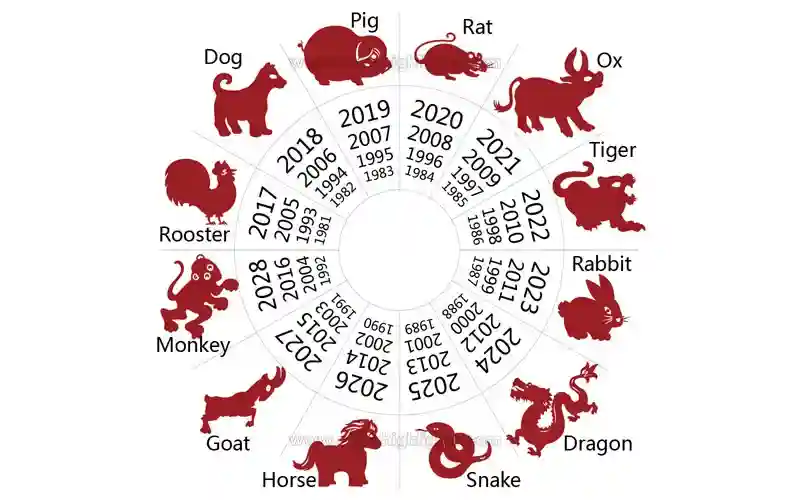Comparing Different Types of Birth Chart Readings: A Beginner's Guide
Embarking on an astrological journey? 🌟 With various astrological systems such as Western, Vedic, and Chinese astrology, choosing the right one can seem overwhelming. This comprehensive guide to types of birth chart readings breaks down the differences, pros, and cons to help you navigate the celestial landscape and find your astrology system.
Table of Contents
Introduction to Birth Charts
A birth chart is a celestial snapshot of the sky at the exact moment and location of your birth. It serves as a cosmic blueprint, revealing insights into your personality, life path, and potential challenges. Understanding the basics of how each system interprets this cosmic data is crucial for your astrology for beginners journey.
Why Birth Charts Matter
- Self-Discovery: Understand your strengths, weaknesses, and life purpose.
- Life Guidance: Navigate career choices, relationships, and personal growth.
- Spiritual Connection: Align with cosmic energies and universal laws.
Popular Astrology Systems
- Western Astrology: Rooted in the Tropical Zodiac.
- Vedic Astrology: Originates from India and uses the Sidereal Zodiac.
- Chinese Astrology: Based on a 12-year lunar cycle.
- Other Systems: Mayan, Celtic, Egyptian astrology, and more.
Western Astrology (Tropical Zodiac)
Overview
Western astrology is the most widely recognized system in the Western world. It uses the Tropical Zodiac, which is based on the Earth's seasons and the apparent path of the Sun across the sky.
Key Features
- Zodiac Signs: 12 signs from Aries to Pisces.
- Planets: Includes traditional planets and sometimes outer planets like Uranus, Neptune, and Pluto.
- Houses: 12 houses representing different life areas.
- Aspects: Angles between planets influencing their interactions.
Interpretation
This system focuses on the psychological aspects, emphasizing personality traits, motivations, and potentials. Understanding Western astrology basics can provide significant insights into how it interprets your horoscope birth chart.
Example Birth Chart

Vedic Astrology (Jyotish or Sidereal Zodiac)
Overview
Vedic astrology, also known as Jyotish, is rooted in ancient Indian scriptures. It uses the Sidereal Zodiac, which aligns with fixed star positions.
Key Features
- Zodiac Signs: 12 signs, similar names but different dates due to the zodiac system.
- Nakshatras: 27 lunar mansions adding depth to readings.
- Dashas: Planetary periods influencing life events.
- Kundli: The Vedic birth chart layout.
Interpretation
Vedic astrology is predictive, focusing on karma, life events, and spiritual growth. It often includes remedies like gemstones and mantras, showcasing the benefits of Vedic astrology in your astrological journey.
Example Birth Chart

Chinese Astrology
Overview
Chinese astrology is based on a 12-year lunar cycle, with each year represented by an animal sign.
Key Features
- Animal Signs: Rat, Ox, Tiger, Rabbit, Dragon, Snake, Horse, Goat, Monkey, Rooster, Dog, Pig.
- Elements: Wood, Fire, Earth, Metal, Water.
- Yin and Yang: Represents duality and balance.
- Four Pillars: Year, month, day, and hour of birth.
Interpretation
Chinese astrology emphasizes destiny and character traits influenced by animal signs and elements, providing unique insights into one's life path.
Example Birth Chart

Other Astrological Systems
Mayan Astrology
- Tzolkin Calendar: 260-day cycle.
- Day Signs: 20 signs representing energies.
- Interpretation: Focuses on spiritual evolution.
Celtic Astrology
- Tree Signs: 13 signs associated with trees.
- Ogham Alphabet: Ancient Celtic script.
- Interpretation: Connection with nature and inner wisdom.
Egyptian Astrology
- Deities: 12 signs named after gods and goddesses.
- Interpretation: Attributes associated with deities influence personality.
Comparison Table
| Aspect | Western Astrology | Vedic Astrology | Chinese Astrology |
|---|---|---|---|
| Zodiac System | Tropical (Seasonal) | Sidereal (Fixed Stars) | Lunar Calendar |
| Signs | 12 Signs (Aries to Pisces) | 12 Signs (Same names, different dates) | 12 Animal Signs |
| Planets | Sun, Moon, Mercury, Venus, Mars, Jupiter, Saturn, Uranus, Neptune, Pluto | Sun, Moon, Mercury, Venus, Mars, Jupiter, Saturn, Rahu, Ketu | Not used in the same way |
| Houses | 12 Houses | 12 Houses (Bhavas) | Four Pillars |
| Key Concepts | Personality, potentials | Karma, destiny, spiritual growth | Destiny, character traits |
| Predictive Focus | Psychological tendencies | Life events, timing (Dashas) | General life phases |
| Remedies | None specific | Gemstones, mantras, rituals | Feng Shui, charms |
| Chart Appearance | Circular chart | Square chart (Kundli) | Pillar chart |
Pros and Cons of Each System
Western Astrology
Pros
- Familiarity: Widely recognized and accessible.
- Psychological Insight: In-depth personality analysis.
- Flexible: Incorporates modern planets and asteroids.
Cons
- Less Predictive: Focuses more on potentials than specific events.
- Seasonal Basis: Critics argue it's less astronomically accurate.
Vedic Astrology
Pros
- Predictive Accuracy: Detailed timing of life events.
- Spiritual Depth: Emphasizes karma and soul growth.
- Remedies: Offers solutions to mitigate challenges.
Cons
- Complexity: Steeper learning curve for beginners.
- Cultural Context: May include unfamiliar concepts.
Chinese Astrology
Pros
- Simplicity: Easy to understand basic traits.
- Cultural Richness: Deep connection with Chinese philosophy.
- Holistic Approach: Incorporates elements and Yin and Yang.
Cons
- Generalization: Broad characterizations based on birth year.
- Less Personalization: Less emphasis on exact birth time.
Other Systems
Mayan Astrology
- Pros: Unique spiritual insights.
- Cons: Less accessible resources.
Celtic Astrology
- Pros: Strong nature connection.
- Cons: Limited modern interpretations.
Egyptian Astrology
- Pros: Mythological depth.
- Cons: Less comprehensive charts.
Choosing the Right System for You
Consider Your Goals
- Self-Understanding: Western astrology offers psychological insights.
- Predictive Guidance: Vedic astrology provides detailed predictions.
- Cultural Interest: Choose a system aligned with your cultural affinities.
Try Multiple Systems
- Cross-Reference: See how different systems interpret your chart.
- Personal Resonance: Notice which system's readings feel more accurate or meaningful.
Consult Professionals
- Astrologers: Seek guidance from experts in each system.
- Online Resources: Utilize reputable websites and apps for chart calculations.
Frequently Asked Questions
Is one astrology system more accurate than others?
- Answer: Accuracy is subjective and depends on personal belief. Each system offers valuable insights in different ways.
Can I use multiple astrology systems?
- Answer: Yes, combining systems can provide a more holistic understanding.
Do I need to know my exact birth time?
- Answer: For Western and Vedic astrology, precise birth time enhances accuracy. Chinese astrology is less dependent on exact time.
How do planetary retrogrades affect readings?
- Answer: Retrogrades influence interpretations differently in each system. Generally, they signify periods of introspection or challenges.
Conclusion
Exploring different types of birth chart readings can enrich your astrological journey. Whether you're drawn to the psychological depth of Western astrology, the predictive power of Vedic astrology, or the cultural richness of Chinese astrology, each offers unique pathways to self-discovery. Understanding the intricacies of each system can greatly enhance your cosmic journey.
Remember, the best system is the one that resonates with you and aids in your personal growth. So, embrace the stars, and let your cosmic blueprint guide you! 🌠












